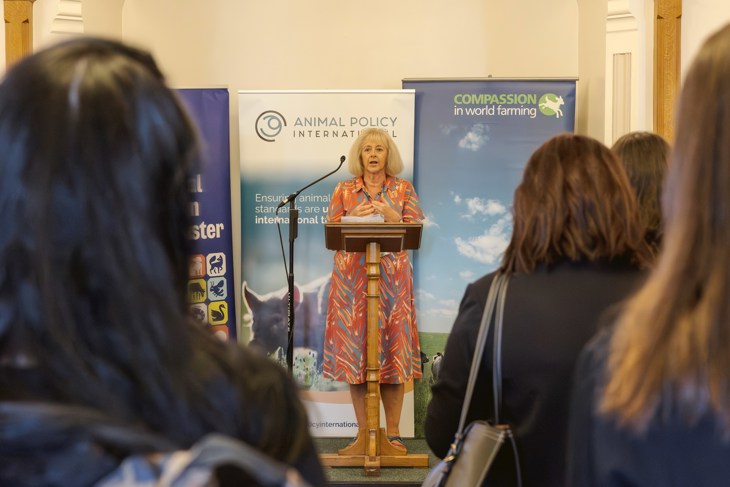
Yesterday (29th April), alongside Animal Policy International and the RSPCA we launched a new report – “Closing the Welfare Gap: Why the UK Must Apply Its Animal Protection Standards to Imports”, at a Parliamentary reception in Westminster.
The report reveals that of the UK’s 88 trading partners that can currently, or may soon, export animal products to the UK without tariffs, 84 (95%) have lower farmed animal welfare standards than the UK. It warns that many animal products imported into the UK are produced using methods that are illegal here, and there is an urgent need to address this issue to avoid it worsening with new trade deals that could undermine both British values and higher welfare UK farmers.
Consistency and compassion
The report launch was well attended, with over 30 cross-party MPs gathered at a Parliamentary reception. The event was hosted by Ruth Jones, Labour MP for Newport West and Islwyn, who said: "It's all about consistency and compassion. How can we claim to care about animal welfare in this country when we allow imports that would be illegal to produce here."
Industry support was also heard from Morgan Brobyn from the British Egg Industry Council adding: “We banned barren battery cages [in the UK]... we're in favour of raising standards, but what we can't have products that are illegal to produce in this country coming in via the back door."
Time to close the welfare gap
Our Patron, entrepreneur and Dragons’ Den star, Deborah Meaden who penned the foreword for the report, said: “Closing this "welfare gap" must be a priority. It’s about integrity. We don't just want suffering outsourced overseas - we want an end to farmed animal cruelty entirely.”
Imports undermining UK welfare laws
The report shows a significant amount of animal products sold in the UK are imported from countries with less stringent animal welfare regulations. These products are often produced using methods that would be illegal in the UK, undermining the effectiveness of UK laws. For example, although barren battery cages for egg-laying hens were banned in the UK in 2012, new trade deals could allow these products from countries like India and Mexico.
Lower welfare imports also create an uneven playing field, disadvantaging higher-welfare British farmers. It is vital the Government ensure imported products meet the same higher welfare standards we expect British farmers to uphold so they don’t face unfair competition.
James West, our Chief Public Affairs Manager said: “It is encouraging to see this new report galvanise interest from so many MPs who attended our event in Parliament. An overwhelming 84% of British people support restricting or banning low-welfare imports that do not meet UK standards, so it’s vital policy makers take note and act. It is imperative that the Government ensures all animal products sold in the UK, whether produced domestically or imported, meet British animal welfare standards.”
